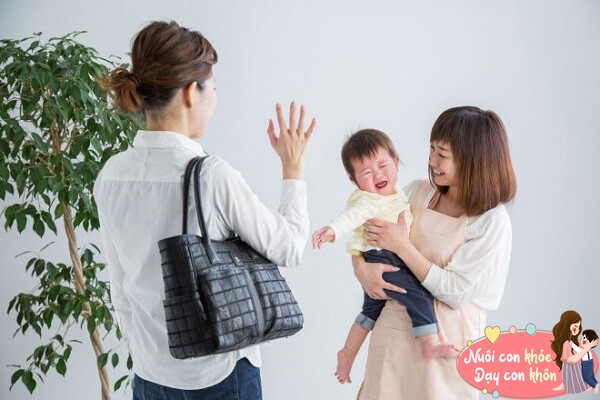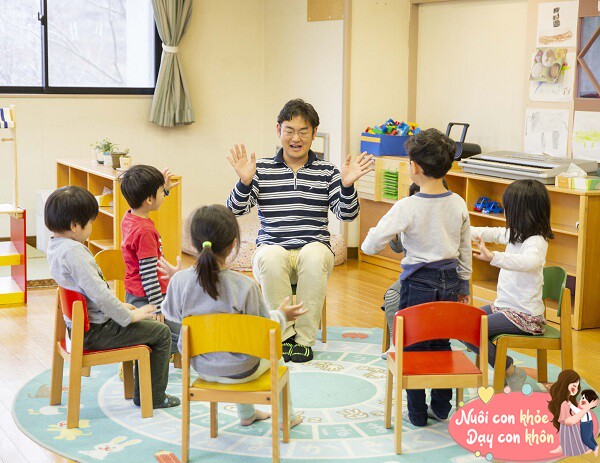So how can we minimize this issue? An experienced kindergarten teacher of over 20 years shares insights on why some children easily adapt to kindergarten, which parents can refer to and nurture in their children early on.

3 Reasons Why Children Don’t Cry and Easily Adapt in Their First Days of Kindergarten
Children Have a Better Understanding of the School Environment
Most children cry due to fear of strangers and unfamiliar surroundings. When entering kindergarten for the first time, children often don’t know what to expect and feel anxious about being separated from their parents. This can lead to negative reactions, causing children to think of kindergarten as a scary place where they can’t find the same safety and love as at home.
Children worry about not having anyone familiar by their side to rely on, and this only increases their fear. They don’t realize they can form new relationships and have enjoyable experiences at kindergarten; they only see the sense of loss.
On the other hand, children who are already familiar with kindergarten tend to feel more comfortable when they return. They know exactly where they are going, what facilities are available, and what activities await them.
Children will feel a sense of familiarity with the learning environment, from classrooms to playgrounds, which helps reduce their anxiety. When children have had prior positive experiences, they can easily integrate into the new environment.

Children crying in their first days of school is a common worry for parents.
Children Yearn for Kindergarten Life
Some children, despite knowing what kindergarten entails, may not fully understand or realize what they will do once they get to class. This creates a sense of unfamiliarity, leading to confusion and anxiety. Whenever children sense something unfamiliar, they may exhibit resistance, not wanting to leave their parents’ embrace and participate in group activities.
If children cannot visualize what awaits them at school, they may feel like they are stepping into a completely new world where everything is strange. This lack of information can cause unease, so it is essential to help children gain a clearer understanding of the learning environment.
When provided with clear information about the fun activities they will engage in, such as eating delicious food, playing on slides and swings, or doing crafts with their teachers, children are more likely to be psychologically inclined towards kindergarten. When children know that school is not just about studying but also about having fun and exploring, they will be more motivated to participate.
In a child’s mind, kindergarten can become an appealing “playground” where they can make new friends and engage in exciting activities.
Children Have Playmates at School
Some children find it easier to fit in because they already have friends at school or are familiar with some people in the environment.

Having playmates in class helps children adapt more easily.
For example, playmates from the neighborhood, children of relatives, or even teachers they have met before—all these factors play a crucial role in helping children accept and adapt to kindergarten.
When children have established relationships, their sense of security and confidence is reinforced. The presence of friends or familiar faces makes children feel less alone in this new journey, but instead, they have companions sharing the same experience.

To Help Children Adapt to Kindergarten Without Tears, Parents Should Do the Following
Let Your Child Familiarize Themselves with the School’s Facilities
After choosing a school, if possible, take your child for a visit to explore the premises.
Through this visit, parents can gain a better understanding of the school’s facilities and assess if this kindergarten is an ideal place for their child.
Factors such as classroom and playground spaces, learning equipment, and hygiene facilities will significantly impact your child’s experience.

Allow your child to familiarize themselves with the school’s facilities.
Secondly, taking your child on a tour of the school helps them gain sufficient knowledge about kindergarten and facilitates their introduction to the new environment. When children can see their classrooms, meet their teachers, and interact with their potential classmates, the sense of unfamiliarity will gradually diminish.
When visiting the kindergarten, it is best to let your child independently explore some of the school’s facilities. For example, let them play on the slides and swings or participate in light recreational activities.
Help Your Child Learn About Daily Life at Kindergarten
To further enhance your child’s ability to adapt to kindergarten, it is beneficial to provide them with insights into daily life at school.
You can show your child audio or video materials that offer a detailed look at the specifics of kindergarten life.
Additionally, many kindergartens nowadays organize open house events during enrollment, allowing parents and children to experience a day in the life of a kindergarten student. Participating in such activities can give your child a deeper understanding.
Help Your Child Make Friends or Get to Know Their Teachers Beforehand
Doing so will help alleviate your child’s fears about the unfamiliar environment and foster bonding from the outset.
When children have the opportunity to meet their teachers, they can sense their friendliness and warmth. Teachers play a vital role in guiding and supporting children through the integration process. If children feel familiar with and trust their teachers, going to school will become a more positive experience.

Build more connections and engage in fun activities.
Additionally, making friends with classmates is essential. Children will feel less alone when they realize they are not the only newcomers in this environment. Organize small get-togethers where they can play and interact with each other.
The kindergarten years are crucial for children’s holistic development and their transition into group living. Therefore, parents should prepare their children in advance to ensure a smooth entry into kindergarten.







































